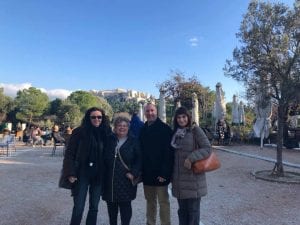My work provides me the opportunity to travel. Sometimes the travel is up and down our state visiting schools, attending professional development, or participating in a meetings. The size of Delaware makes it possible to be in all three counties in the same day. This is a an advantage when you want to bring people together for professional development or a meeting. The opportunity to collaborate with outstanding educational leaders across this state is one of the most rewarding aspects of my work at the University of Delaware.
Recently I have been engaged with several important partnerships which have required a new roadmap for my travel. The Delaware Academy for School Leadership has partnered with the Delaware Center for Disabilities, the Delaware Department of Education, and 20 schools from Delaware’s three counties to participate in a Professional Learning Network (PLN) focused on improving services for special education. The PLN includes statewide face-to-face meetings with guest speakers, differentiated break-out sessions, cross-school collaboration, and team time. There have also been virtual sessions to provide on-going opportunities for collaboration and learning. This is the first year DASL has traveled this road and we are excited by the response and engagement of the school teams. We are planning site visits to schools in the spring. I have my GOOGLE Map ready to go.
I hope you were able to attend DASL’s Women Leading DE Conference on January 24 at Dover Downs Conference Center. DASL collaborated with the Partnership for Public Education to host a conference focused on women leading education in Delaware. Dr. Margaret Grogan, Professor and researcher from Chapman University in California provided the keynote address. She provided national data regarding the percentage of women leading districts and schools in the United States compared to men. She also provided information about the challenges and opportunities. I met Dr. Grogran a year ago on another road trip when I was working with the American Association for School Administrators. I am so glad I made that trip and met Margaret. Her knowledge of the research regarding women in education leadership roles is noteworthy. Over 250 women and men attended the conference which provided opportunities for collaboration and learning. One of the most popular sessions was the morning panel of Delawares’ former and current Secretaries of Education–Valerie Woodruff, Lillan Lowery and Susan Bunting.
I must admit that I never expected to travel to Athens, Greece this year. To quote Dr. Seuss–“Oh, the places we can go!” I was invited to provide two days of professional development to new teachers at the prestigious Athens College in Greece. Athens College is a K-12 school. I invited Dave Santore, Leadership Specialists for DASL to join me for this work. Dave and I were asked to provide 32 new teachers with professional development on the topics of lesson planning and classroom management. We enjoyed working with the new teachers and school directors. The teachers were able to read and speak English as well as Greek. All have a master’s degree in their content or specialty area in which they are teaching. While visiting Athens, we were provided a guided tour of the Acropolis Acropolis Museum, and Parthenon We also visited the town of Plaka with the school directors who took us to lunch or dinner while providing Dave and me with wonderful history lessons about the school, the city and and the culture. The experience of traveling and working with educators in Greece has reaffirmed fort me the importance of providing our students with opportunities for a global education. Oh, the places we can go!!







